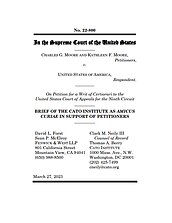Learn more about Cato’s Amicus Briefs Program.
Can the government impose an income tax when you never had income? That may seem like a trick question, but it’s exactly what happened to Charles and Kathleen Moore. In 2006, the Moores invested in a start-up Indian company called KisanKraft, whose goal was to provide low-cost, efficient tools to rural Indian farmers. The Moores believed in KisanKraft’s mission and retained their shares of KisanKraft for over a decade, never selling it for a profit. And KisanKraft reinvested all of its own profits in the company, never paying dividends. For that reason, the Moores never saw a dollar from their investment.
Yet in 2017, the Moores suddenly received a hefty federal tax bill for their ownership stake in KisanKraft. How could that be, if they never earned any money from their holdings? The reason is a provision of the 2017 Tax Cuts and Jobs Act called the Mandatory Repatriation Tax. For U.S. taxpayers who met a certain minimum threshold of ownership in certain foreign corporations, the Mandatory Repatriation Tax imposed a tax bill as if those taxpayers had earned a 2017 dividend from the corporation for profits going back years. Because the Moores owned roughly 13 percent of KisanKraft shares, they were taxed as if KisanKraft had paid them a 2017 dividend worth 13 percent of KisanKraft’s earnings since 2006. Even though that 2017 dividend was fictional, their tax bill was very real.
The Moores challenged this tax in court, arguing that it was unconstitutional. Under the original Constitution, the federal government could only impose “direct” taxes if those taxes were apportioned among the states based on population (that is, such taxes were only allowed if the total amount of money collected from each state was equal on a per capita basis). After the Supreme Court held that a federal income tax would be a direct tax subject to this apportionment requirement, Congress proposed and the states ratified the Sixteenth Amendment. That amendment explicitly exempted “income” taxes from the apportionment requirement, allowing the regime of federal income taxes that we live with today.
But since the Sixteenth Amendment was enacted, the Supreme Court has consistently held that a tax only qualifies as an “income” tax if it is imposed on money that a taxpayer has actually “realized,” in tax law parlance. The Moores argued that since they never realized any income from their ownership stake in KisanKraft, the Mandatory Repatriation Tax cannot be an “income tax.” And there is no dispute that the Mandatory Repatriation Tax was not apportioned among the states on an equal per capita basis, so if it is not an income tax, it is unconstitutional.
But a federal district court and the Court of Appeals for the Ninth Circuit both rejected this argument, holding that the Mandatory Repatriation Tax is an income tax. Surprisingly, the Ninth Circuit explicitly held that realization of income is not a requirement for an income tax. Now the Moores have petitioned the Supreme Court to take their case, and the Cato Institute has filed an amicus brief supporting that petition.
In our brief (which was co-authored by Fenwick & West attorneys David Forst & Sean McElroy), we recount how the Supreme Court has consistently held that an “income” tax can only be imposed on realized income. Most relevant to this case, the Supreme Court explicitly held in Eisner v. Macomber (1920) that a mere raise in the value of stock holdings, without a monetary dividend, is “capital, not income.” The Moores similarly never received a monetary dividend from their holdings, which means they also never received income.
If the bright-line rule requiring realization for an income tax to be imposed were jettisoned, then there would be no limit to the types of taxes the federal government could enact. Indeed, such a rule would open the door for the federal government to impose a future wealth tax entirely divorced from any connection to actual income. To ensure we do not start down that path, the Supreme Court should take this case and reject the Ninth Circuit’s approach.

This work is licensed under a Creative Commons Attribution-NonCommercial-ShareAlike 4.0 International License.


